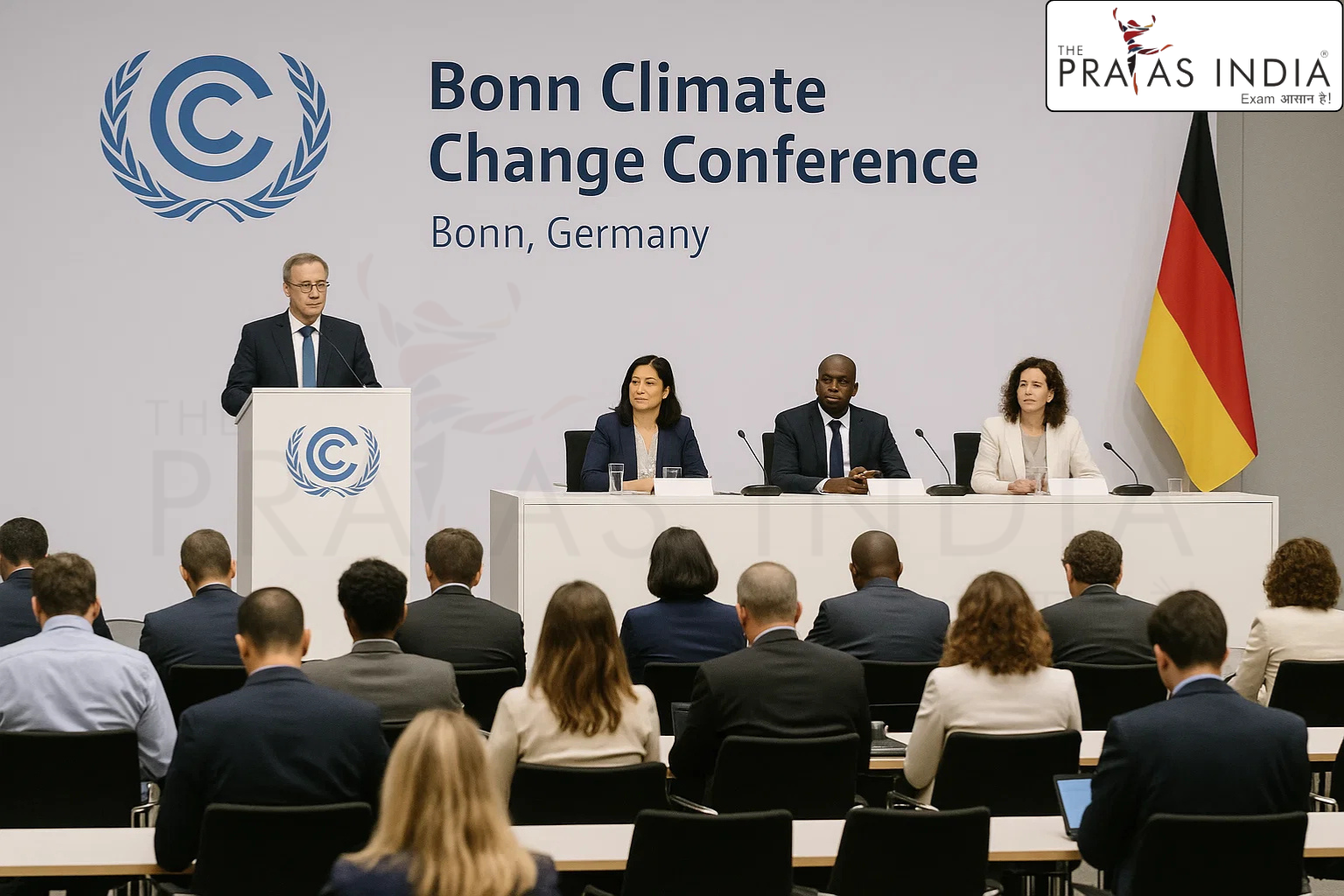Bonn Climate Change Conference 2025: Key Outcomes and India’s Role
The Bonn Climate Change Conference 2025, held under the umbrella of the United Nations Framework Convention on Climate Change (UNFCCC), has emerged as a pivotal platform for shaping global climate policy and progress. Taking place from June 16 to June 26, 2025, in Bonn, Germany, this year’s conference is drawing attention for its focused discussions on climate finance, the Global Goal on Adaptation (GGA), and pathways for developing nations to strengthen resilience against climate change.
With over 5,000 participants, including government officials, scientific experts, civil society groups, and Indigenous representatives, the conference is setting the groundwork for decisions to be finalised at COP30 later this year.

🌍 What is the Bonn Climate Change Conference?
The Bonn Climate Change Conference is the annual mid-year meeting of the subsidiary bodies of the UNFCCC. These include:
-
Subsidiary Body for Implementation (SBI) – which reviews how climate decisions are being implemented and supports capacity building and funding mechanisms for developing countries.
-
Subsidiary Body for Scientific and Technological Advice (SBSTA) – which provides scientific input and evaluates technical policies, technologies, and methodologies related to climate change.
The conference is essential in shaping negotiations for the Conference of the Parties (COP), held every November. While COP is known for headline climate agreements, Bonn serves as the technical and policy groundwork.
🔍 Key Themes and Outcomes from 2025
1. The Global Goal on Adaptation (GGA)
A central agenda point in 2025, the Global Goal on Adaptation aims to define a common global framework to build climate resilience. While the GGA was introduced in the Paris Agreement (2015), substantial clarity was only achieved at COP28 in Dubai, where a global framework was adopted.
In Bonn 2025:
-
Nations discussed metrics to track adaptation progress.
-
There was agreement on enhancing national adaptation plans (NAPs).
-
Dialogues emphasised equity and capacity building for the Global South.
2. Climate Finance for Developing Countries
Another significant theme was the need for adequate and predictable climate finance, especially as the 2025 deadline nears for a new collective quantified goal on finance (post the $100 billion/year pledge of developed nations).
-
Discussions focused on loss and damage funding mechanisms.
-
Developing nations, including India, pushed for climate justice and equitable access to funds.
-
Emphasis was placed on transparency and direct access to climate finance for vulnerable countries.
3. Scientific Inputs and Transparency
The SBSTA sessions in Bonn 2025 also discussed:
-
Integrating climate science into policy design.
-
Enhancing transparency frameworks under the Paris Agreement’s Enhanced Transparency Framework (ETF).
-
Promoting technology transfer and collaborative innovation.
India’s Role and Participation
India played an active and assertive role at Bonn 2025, emphasising the principles of Common But Differentiated Responsibilities (CBDR) and climate equity. Key highlights of India’s participation include:
-
Advocating for increased climate finance, especially for adaptation and resilience-building in vulnerable regions.
-
Highlighting the success of national missions under the National Action Plan on Climate Change (NAPCC).
-
Promoting South-South cooperation and extending technical support to other developing nations.
-
Calling for greater technology transfer and support for green innovation in emerging economies.
India’s delegation reiterated that while it is committed to its Nationally Determined Contributions (NDCs), developed countries must lead on historical responsibility, financing, and technology sharing.
📘 Relevance for UPSC and Other Competitive Exams
The Bonn Climate Change Conference 2025 holds high importance for aspirants preparing for:
-
UPSC Civil Services Examination (GS Paper III – Environment & GS Paper II – International Relations)
-
State PCS and Environmental Law exams
-
Essay writing and current affairs-based interviews
Topics such as climate diplomacy, adaptation vs mitigation, global cooperation, and India’s climate commitments frequently appear in both objective and descriptive sections of these exams.
✅ Conclusion
The Bonn Climate Change Conference 2025 has set a significant tone ahead of COP30. With climate risks intensifying, the need for global cooperation, fair financing, and equitable adaptation strategies has never been more urgent. India’s proactive role at the conference highlights its growing leadership in climate negotiations and its commitment to sustainable development.
At The Prayas India, we ensure aspirants stay informed about such critical developments, helping them integrate dynamic global issues into their UPSC preparation journey.




![Prayas-तेजस [UPSC CSE Sociology Optional] – Online & Offline](https://theprayasindia.com/wp-content/uploads/2025/09/Prayas-तेजस-UPSC-CSE-Optional-Subject-The-Prayas-India-300x300.png)
![Prayas-सूत्र [UPSC CSE Materials (Hardcopy)]](https://theprayasindia.com/wp-content/uploads/2025/09/Prayas-सूत्र-UPSC-CSE-Study-Materials-Hardcopy-The-Prayas-India-300x300.png)
![Prayas-मंत्रा [UPSC CSE CSAT]](https://theprayasindia.com/wp-content/uploads/2025/09/Prayas-मंत्रा-UPSC-CSE-CSAT-The-Prayas-India-300x300.png)
![Prayas सारथी [UPSC CSE One on One Mentorship]](https://theprayasindia.com/wp-content/uploads/2025/09/Prayas-सारथी-UPSC-CSE-One-on-One-Mentorship-The-Prayas-India-300x300.png)










